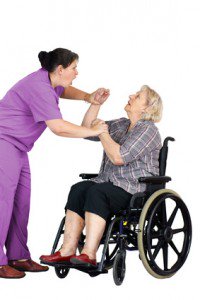
Pay attention to your loved one if they are being taken care of by others or home alone – elderly abuse if very present.
According to the National Center on Elder Abuse (NCEA), one in every ten Americans age 60 and over experience elder abuse each year, many of them in multiple ways such as physical abuse, sexual abuse, and emotional or psychological abuse. Unfortunately, this is a crime that is severely under-reported, as it is estimated that only one in fourteen cases is ever brought to the attention of authorities. Dementia may be to blame as to why only a small number of these cases are reported. The abused senior may not remember the abuse or simply feel like they have no one to tell. In many cases, the abuser is a close family member and they just don’t want them to get into trouble.
According to the NCEA, elder abuse comes in a wide variety of forms. Below we describe the types of elder abuse. Education on this topic and knowing the signs is the best way to prevent elder abuse. Please note that this list can be very difficult to read due the nature of its content.
Physical Abuse
This is defined as any physical force that results in bodily injury, pain, or impairment. This not only includes the types of physical abuse most commonly thought of, such as hitting, shoving, and kicking, but more insidious ones, such as force-feeding, intentionally administering drugs inappropriately, or use of physical restraints. Signs of physical abuse include bruises, fractures, sprains, broken eyeglasses, and sudden changes in behavior on the part of the elder. Be aware of the signs of physical abuse such as the senior avoiding eye contact and wearing strange clothing like long sleeves in the summer time.
Sexual Abuse
This is defined as any type of non-consensual sexual act with an elderly individual. This includes not only rape but forced nudity and sexually explicit photographing. Signs of sexual abuse include bruises around genitalia, genital infections, unexplained vaginal bleeding, and underwear that is torn, stained, or bloody.
Emotional or Psychological Abuse
This is defined as the infliction of pain or anguish through verbal or nonverbal threats. This includes verbal insults, threats, humiliation, intimidation, and isolation. Signs of emotional abuse include the senior being emotionally agitated, suddenly withdrawn from activities, changes in alertness or an onset of depression.
Neglect
This is defined as a failure or refusal to fulfill obligations of care toward an elder. This includes not providing the elder with water, food, shelter, clothing, medication, hygiene, and personal safety.
Some examples of senior neglect include:
- Not providing heat in the winter time in turn leaning the senior open to getting pneumonia or other medical conditions.
- Not changing their bed position or sheets so they are prone to bed sores and much worse.
Signs of neglect include bed sores, dehydration, malnutrition, and hazardous or unsanitary living conditions. Be sure to check in on your senior loved one’s living conditions to check for these signs of abuse neglect.
Abandonment
Abandonment is defined as the desertion of an elderly person by someone who has assumed responsibility for caring for them. This does not have to mean leaving an older person alone in a public place; an individual can be considered abandoned even if they are left in the care of a hospital or nursing facility and you have cut off all contact with them.
Financial of Material Exploitation
Financial of Material Explortation is defined as improper or illegal use of an elder’s money, assets, or property. This includes cashing checks in their name without permission, forging their signature, theft of property, and coercing an elder to sign a legal document. Signs of financial exploitation include unexplained withdrawals in the elder’s bank account, abrupt changes in their will, and unexplained disappearances of their possessions.
In any of these cases, if you suspect elder abuse is being committed against someone, it is extremely important and urgent for you to report it as soon as possible.If you are a caregiver and notice these things are happening by family members, it’s important to speak to the authorities. If you are a neighbor or person who sees the senior often and notice any of these signs, report them right away. If the abuse has occurred in an assisted living home, you should contact the ombudsperson assigned to that facility. Otherwise, please contact the Office of Adult Protective Services (APS) in your state. This office will take your report, and investigate, evaluate, and monitor the situation. If needed, APS will arrange for medical care, legal assistance, emergency shelter, and other support services for the victim.
You may also be interested in reading: What Does Aging in Place Really Mean?


